
 |
home ao english musik literatur journalismus bilder sprachen mehr shop sitemap | |
In der Urzeit 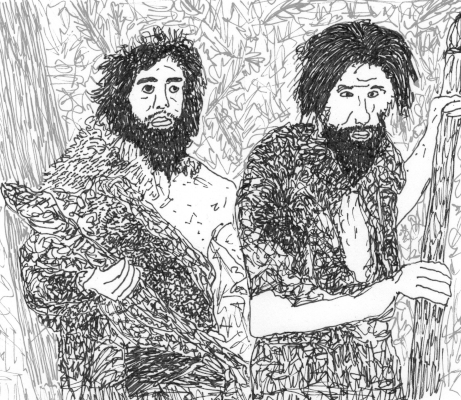 |
In Primeval Times  |
Dans la Préhistoire  |
Nella Preistoria  |
En la Prehistoria  |
(Deutsch) Heinz und Helmut sind „Die Jungs”. In der Fünf-Minuten-Dialogserie geraten die beiden in die unwahrscheinlichsten Situationen. |
(English) Heinz and Helmut are "The Boys". In the five-minute dialogue series, the two get into the most unlikely situations. |
(Français) Heinz et Helmut sont « Les Gars ». Dans la série de dialogues de cinq minutes, les deux se retrouvent dans les situations les plus improbables. |
(Italiano) Heinz e Helmut sono "I Ragazzi". Nella serie dialogata di episodi di cinque minuti, i due si trovano nelle situazioni più improbabili. |
(Español) Heinz y Helmut son "Los Chicos". En esta serie de diálogos de cinco minutos, los dos se encuentran en las situaciones más inverosímiles. |
Die Jungs in der Urzeit (2025): Nach ihrer Ausbildung bei der Magierin fühlen sich Heinz und Helmut bereit, ihre erste gesteuerte magische Reise in die Vergangenheit zu unternehmen. Sie erbitten sich Goethes Locke, die sie bei Nicoleta gesehen haben, und machen alles so, wie sie es gelernt haben, um den berühmten Dichter in seiner Sturm- und Drangzeit in Frankfurt zu erleben. Aber etwas geht schief. Allmählich wird Heinz und Helmut klar, wie weit sie tatsächlich in der Vergangenheit zurückgereist sind. |
The Boys in Primeval Times (2025): After their training with the magician, Heinz and Helmut feel ready to undertake their first controlled magical journey into the past. They ask for Goethe's curl, which they saw with Nicoleta, and do everything as they have learned it, to experience the famous poet in his Sturm und Drang period in Frankfurt. But something goes wrong. Gradually, Heinz and Helmut realize how far back in time they have actually traveled. |
Les Gars dans la Préhistoire (2025) : Après leur formation chez la magicienne, Heinz et Helmut se sentent prêts à faire leur premier voyage magique contrôlé dans le passé. Ils demandent la boucle de Goethe qu'ils ont vue chez Nicoleta et font tout comme ils l'ont appris pour vivre l'expérience du célèbre poète dans sa période du Sturm und Drang à Francfort. Mais quelque chose tourne mal. Peu à peu, Heinz et Helmut se rendent compte à quel point ils ont réellement voyagé dans le passé. |
I Ragazzi nella Preistoria (2025): Dopo la loro formazione con la maga, Heinz e Helmut si sentono pronti per intraprendere il loro primo viaggio magico controllato nel passato. Chiedono il ricciolo di Goethe, che hanno visto da Nicoleta, e fanno tutto come hanno imparato per incontrare il famoso poeta nel suo periodo dello Sturm und Drang a Francoforte. Ma qualcosa va storto. A poco a poco, Heinz e Helmut si rendono conto di quanto effettivamente siano tornati indietro nel passato. |
Los Chicos en la Prehistoria (2025): Después de su formación con la maga, Heinz y Helmut se sienten preparados para emprender su primer viaje mágico controlado al pasado. Piden el rizo de Goethe que vieron con Nicoleta y hacen todo como han aprendido para experimentar al famoso poeta en su época del Sturm und Drang en Fráncfort. Pero algo sale mal. Poco a poco, Heinz y Helmut se dan cuenta de lo lejos que realmente han viajado en el tiempo. |
(English) Three weeks after Maria's birth, Heinz and Helmut meet again at Hedu's house and have a lot to talk about. When Heinz picks up the baby, he witnesses a curious occurrence that the others do not notice. |
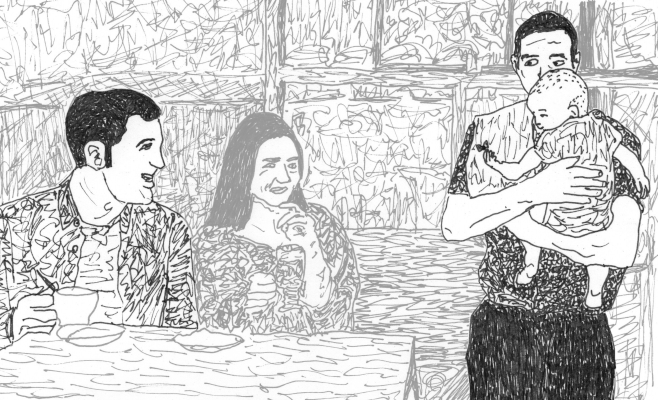 |
(Italiano) Tre settimane dopo la nascita di Maria, Heinz e Helmut si ritrovano a casa di Hedu e hanno un sacco di cose da raccontarsi. Quando Heinz prende in braccio la bambina, è testimone di uno straordinario evento che gli altri non notano. |
(Deutsch) Drei Wochen nach Marias Geburt treffen sich Heinz und Helmut in Hedus Haus wieder und haben einander viel zu erzählen. Als Heinz das Baby auf den Arm nimmt, wird er Zeuge einer sonderbaren Begebenheit, die die anderen nicht bemerken. Special Version | ||
Tag 1 Helmut: Hedu und Maria kommen sofort. Da braucht jemand eine neue Windel. Kaffee? |
Day 1 Helmut: Hedu and Maria are coming right away. Someone needs a new diaper. Coffee? |
Jour 1 Helmut : Hédou et Maria arrivent tout de suite. Quelqu'un a besoin d'une nouvelle couche. Du café ? |
Giorno 1 Helmut: Hedu e Maria arrivano subito. Qualcuno ha bisogno di un pannolino nuovo. Caffè? |
Día 1 Helmut: Hedu y María llegan enseguida. Alguien necesita un pañal nuevo. ¿Café? |
(English) Fiona has quickly settled into her new position as managing director, as the agency already has orders waiting. Fanni is surprised by the speed of developments and even more so by the mission on which her friend is sending her. |
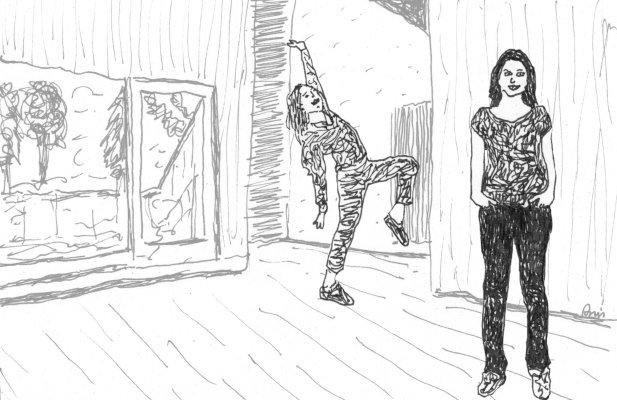 |
(Italiano) Fiona si è ambientata velocemente nel suo nuovo lavoro come gerente, perché ci sono già degli incarichi che aspettano l'agenzia. Fanni è sorpresa dalla rapidità con cui si stanno sviluppando le cose e ancora di più dalla missione che la sua amica le ha affidato. |
(Deutsch) Fiona hat sich schnell in ihre neue Position als Geschäftsführerin eingefunden, denn es warten bereits Aufträge auf die Agentur. Fanni ist überrascht von der Geschwindigkeit der Entwicklungen und noch mehr von der Mission, auf die ihre Freundin sie schickt. Special Version | ||
Tag 2 Fanni: Beeindruckend! |
Day 2 Fanni: Impressive! |
Jour 2 Fanni : Impressionnant ! |
Giorno 2 Fanni: Che figata! |
Día 2 Fanni: ¡Impresionante! |
(English) The Boys are standing in front of Goethe's house in Frankfurt, ready to travel back in time. Or are they? Helmut has some serious gaps in his knowledge of the late 18th century. In any case, the leap is successful. Or is it? Well, we'll see. |
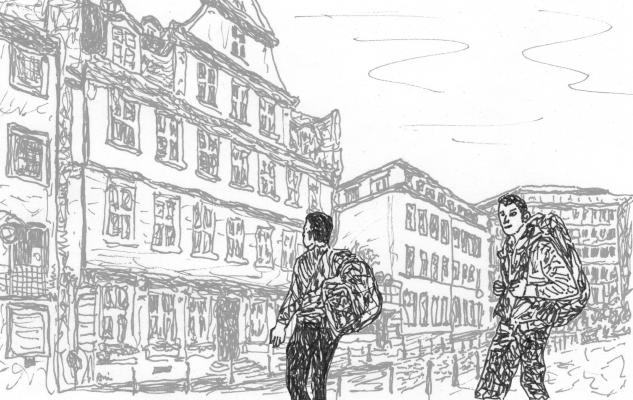 |
(Italiano) I Ragazzi sono davanti alla casa di Goethe a Francoforte e sono pronti per il salto nel tempo. O forse no? Helmut ha un sacco di buchi nella sua conoscenza della fine del XVIII secolo. Il salto comunque riesce. O forse no? Beh, vedremo. |
(Deutsch) Die Jungs stehen vor Goethes Haus in Frankfurt und sind bereit für den Zeitsprung. Oder nicht? Bei Helmut klaffen allerlei Lücken, was Kenntnisse über das spätere achtzehnte Jahrhundert betrifft. Der Sprung jedenfalls gelingt. Oder nicht? Nun, man wird sehen. Special Version | ||
Tag 4 Heinz: Großer Hirschgraben 23. Die Adresse der Familie Goethe in Frankfurt. Wir sind da. Lass uns alles noch mal in Ruhe durchgehen, bevor wir ins Jahr 1774 reisen. |
Day 4 Heinz: Großer Hirschgraben 23. The Goethe family's address in Frankfurt. Here we are. Let's go through everything again thoroughly before we travel back to the year 1774. |
Jour 4 Heinz : Großer Hirschgraben 23. L'adresse de la famille Goethe à Francfort. On y est. Revoyons tout en détail avant de nous rendre en 1774. |
Giorno 4 Heinz: Großer Hirschgraben 23. L'indirizzo della famiglia Goethe a Francoforte. Ci siamo. Ripassiamo tutto nei dettagli prima di viaggiare nel 1774. |
Día 4 Heinz: Großer Hirschgraben 23. La dirección de la familia Goethe en Fráncfort. Ya estamos. Repasemos todo en detalle antes de viajar al año 1774. |
(English) What happened? Instead of exploring historical Frankfurt as planned, the Boys find themselves in a completely different environment. They quickly realize that something must have gone wrong. Fortunately, Helmut is prepared for emergencies like this. |
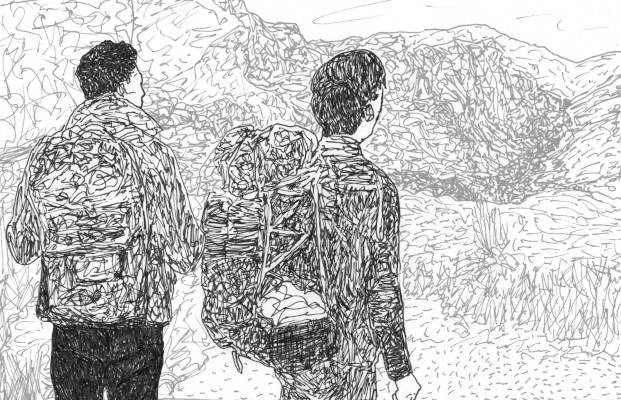 |
(Italiano) Che cosa è successo? Invece di girare per la Francoforte storica come previsto, i Ragazzi si ritrovano in un posto completamente diverso. Capiscono subito che qualcosa è andato storto. Per fortuna Helmut è preparato per emergenze come questa. |
(Deutsch) Was ist passiert? Anstatt sich durch das historische Frankfurt zu bewegen wie geplant, finden sich die Jungs in einer völlig anderen Umgebung wieder. Sie merken schnell, dass irgendetwas schiefgegangen sein muss. Zum Glück ist Helmut auf Notfälle wie diesen vorbereitet. Special Version | ||
Tag 4 Helmut: Wupp |
Day 4 Helmut: Whoop |
Jour 4 Helmut : Woup |
Giorno 4 Helmut: Vup |
Día 4 Helmut: Vup |
(English) For three days now, Heinz and Helmut have been wandering far and wide around the hill where they landed, without success, and their food supplies are dwindling. It's time to make a decision. And time for an edifying discussion about stars and cardinal directions. |
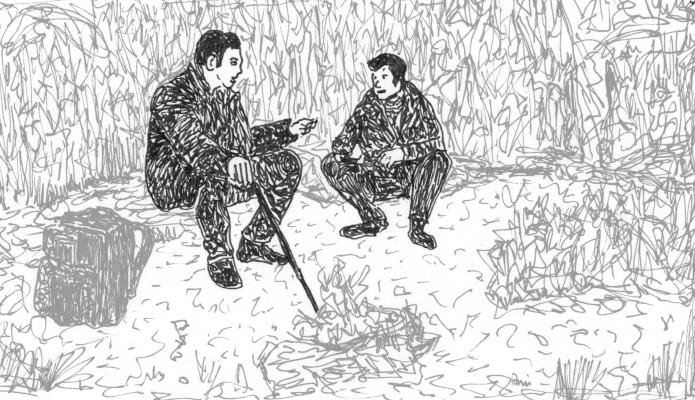 |
(Italiano) Sono già tre giorni che Heinz e Helmut vagano in giro senza successo intorno alla collina dove sono finiti, e le loro scorte di cibo stanno finendo. È ora di prendere una decisione. E di fare una discussione interessante sulle stelle e i punti cardinali. |
(Deutsch) Drei Tage lang irren Heinz und Helmut jetzt schon weitläufig und erfolglos um den Hügel herum, an dem sie gelandet sind, und ihre Nahrungsreserven schwinden. Es ist Zeit für eine Entscheidung. Und für eine erbauliche Diskussion über Sterne und Himmelsrichtungen. Special Version | ||
Tag 7 Helmut: Wir sollten morgen jagen gehen. Wenn wir ausgeschlafen haben. Stocher stocher |
Day 7 Helmut: We should go hunting tomorrow. Once we've had a good night's sleep. Poke poke |
Jour 7 Helmut : On devrait aller chasser demain. Une fois qu'on aura bien dormi. Pique pique |
Giorno 7 Helmut: Domani dovremmo andare a caccia. Dopo una bella dormita. Stuzz stuzz |
Día 7 Helmut: Mañana deberíamos ir a cazar. Después de dormir bien. Hurg hurg |
(English) In search of a suitable lunch, the two roam the land as they head north. The unfamiliar flora and fauna are confusing, but they eventually reach a point where they receive some answers. Not necessarily the answers they wanted, but answers nonetheless. |
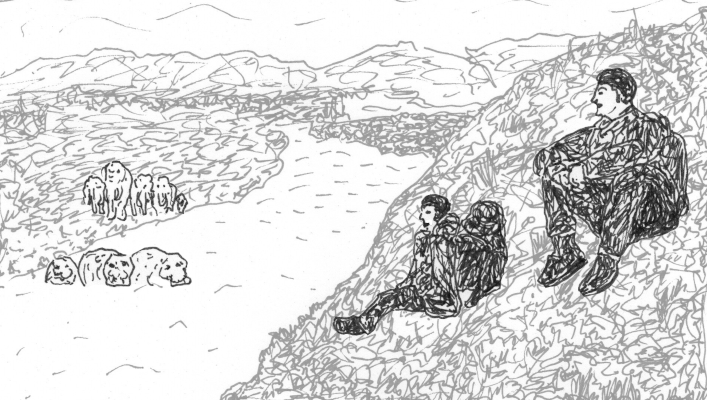 |
(Italiano) Alla ricerca di qualcosa di adatto per pranzo, i due vagano per la campagna in direzione nord. La flora e la fauna sconosciute li confondono, ma alla fine arrivano a un punto in cui ottengono alcune risposte. Non necessariamente quelle che volevano, ma comunque delle risposte.
|
(Deutsch) Auf der Suche nach einem geeigneten Mittagessen durchstreifen die beiden das Land in Richtung Norden. Die ungewohnte Flora und Fauna ist verwirrend, doch kommen sie an einen Punkt, an dem sie endlich einige Antworten erhalten. Nicht unbedingt erwünschte Antworten, aber Antworten. Special Version | ||
Tag 8 Heinz: Aha, so sieht es hier also aus! Bis hier waren wir vorher nicht gekommen. |
Day 8 Heinz: Ah, so this is what it looks like here! We didn't get this far before. |
Jour 8 Heinz : Ah, c'est donc à ça que ça ressemble ici ! On n'était jamais allés aussi loin. |
Giorno 8 Heinz: Ah, quindi è così che è qui! Non siamo mai arrivati così lontano prima d'ora. |
Día 8 Heinz: ¡Ah, así que esto es lo que hay aquí! No habíamos llegado tan lejos antes. |
(English) Helmut may not have been prepared for the Goethe era, but he manages surprisingly well in prehistoric times. He doesn't let himself get down and still retains his sense of reality. Perhaps that's why fate provides him and Heinz with a little friend. |
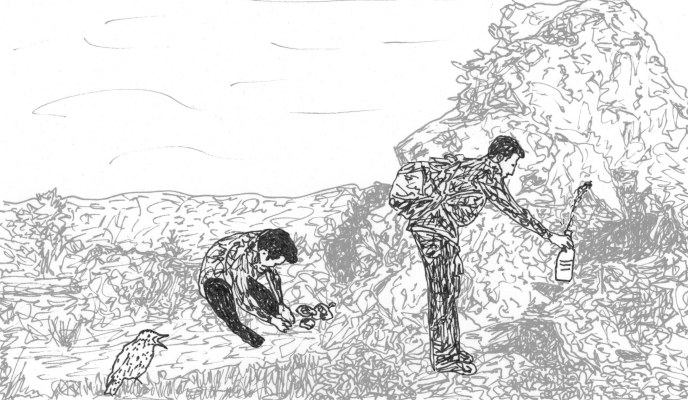 |
(Italiano) Helmut forse non era pronto per l'epoca di Goethe, ma se la cava sorprendentemente bene nell'era preistorica. Non si lascia abbattere e comunque non perde il senso della realtà. Forse è per questo che il destino gli ha messo accanto un piccolo amico, insieme a Heinz. |
(Deutsch) Helmut mag auf die Goethe-Zeit nicht vorbereitet gewesen sein, doch in der Urzeit kommt er erstaunlich gut zurecht. Er lässt sich nicht unterkriegen und verliert trotzdem seinen Sinn für die Realität nicht. Vielleicht ist das der Grund, aus dem das Schicksal ihm und Heinz einen kleinen Freund an die Seite stellt. Special Version | ||
Tag 8 Helmut: Zehntausend Jahre? Bist du irre, Mann? |
Day 8 Helmut: Ten thousand years? Are you crazy, man? |
Jour 8 Helmut : Dix mille ans ? T'es fou, mec ? |
Giorno 8 Helmut: Diecimila anni? Sei fuori di testa, amico? |
Día 8 Helmut: ¿Diez mil años? ¿Estás loco, tío? |
(English) They have been living in their shelter for three weeks now, and little has happened. Heinz should be happy that Helmut is looking ahead and taking the initiative, but he seems a little overwhelmed by the situation. Understandable, in a way. |
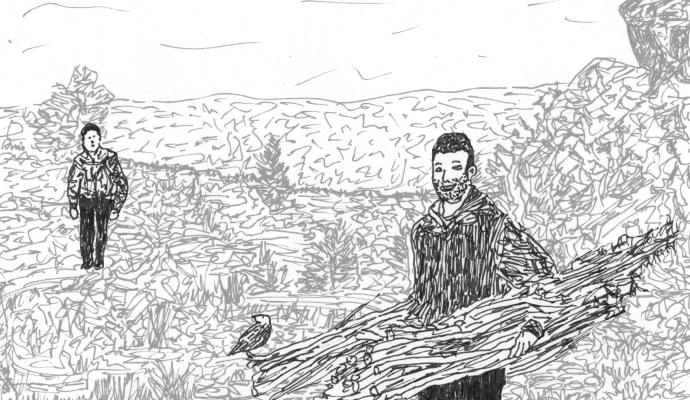 |
(Italiano) Sono ormai tre settimane che vivono nel loro rifugio e non è successo quasi niente. In realtà Heinz dovrebbe essere contento che Helmut stia pensando al futuro e stia prendendo l'iniziativa, ma sembra un po' sopraffatto dalla situazione. In un certo senso è comprensibile. |
(Deutsch) Seit drei Wochen leben sie nun in ihrem Unterschlupf und wenig ist passiert. Eigentlich sollte sich Heinz darüber freuen, dass Helmut planvoll in die Zukunft blickt und die Initiative ergreift, doch ist er wohl mit der Situation ein wenig überfordert. Verständlich, irgendwie. Special Version | ||
Tag 29 Heinz: Was bastelst du da eigentlich seit Tagen, verrätst du es mir endlich? Willst du ein riesiges Feuer machen, um Menschen anzulocken? |
Day 29 Heinz: What have you been cooking up for days now? Will you finally tell me? Are you planning to build a huge fire to attract humans? |
Jour 29 Heinz : Qu'est-ce que tu mijotes depuis des jours ? Tu vas enfin me le dire ? Tu prévois d'allumer un énorme feu pour attirer des humains ? |
Giorno 29 Heinz: Che cosa stai combinando da giorni? Me lo dici finalmente? Vuoi accendere un falò enorme per attirare degli umani? |
Día 29 Heinz: ¿Qué estás tramando desde hace días? ¿Me lo vas a decir por fin? ¿Quieres encender una hoguera enorme para atraer a unos humanos? |
(English) The next day, the raft is ready to set off. Helmut has now fully integrated into his surroundings and is doing his best to infect his traveling companion with his energy and optimism, but Heinz is slow to get used to the prehistoric conditions. |
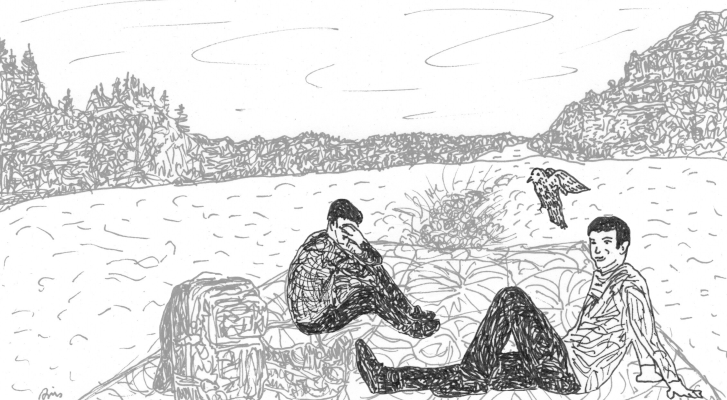 |
(Italiano) Il giorno dopo la zattera è pronta per partire. Helmut si è ormai integrato perfettamente nell'ambiente e fa di tutto per trasmettere al suo compagno di viaggio la sua energia e il suo ottimismo, ma Heinz si abitua solo lentamente alle condizioni preistoriche.
|
(Deutsch) Am nächsten Tag ist das Floß bereit für die Abfahrt. Helmut ist inzwischen voll in seine Umgebung integriert und gibt sich redlich Mühe, seinen Reisegefährten mit seiner Energie und Zuversicht anzustecken, doch Heinz gewöhnt sich nur langsam an die prähistorischen Umstände. Special Version | ||
Tag 30 Heinz: Sind das alle Lotusblätter oder sind da noch irgendwo welche? Helmut? Wo ist der Typ? Ah, da kommt er ja. Haben wir noch mehr Blätter? |
Day 30 Heinz: Are those all the lotus leaves, or are there any more somewhere? Helmut? Where is that guy? Ah, here he comes. Do we have any more leaves? |
Jour 30 Heinz : C'est tout ce qu'il y a comme feuilles de lotus, ou il y en a d'autres quelque part ? Helmut ? Où est le gars ? Ah, le voilà qui arrive. On a d'autres feuilles ? |
Giorno 30 Heinz: Sono tutte le foglie di loto o ce ne sono altre da qualche parte? Helmut? Dov'è quel ragazzo? Ah, eccolo che arriva. Abbiamo altre foglie? |
Día 30 Heinz: ¿Esas son todas las hojas de loto que hay, o hay más en algún otro sitio? ¿Helmut? ¿Dónde está el chico? Ah, ahí viene. ¿Tenemos más hojas? |
(English) Helmut catches a big fish from the raft. To grill it, they go ashore on an island in the Rhine that is no ordinary island. Helmut becomes astonishingly creative there and has a shamanic experience for which he has to pay a price. |
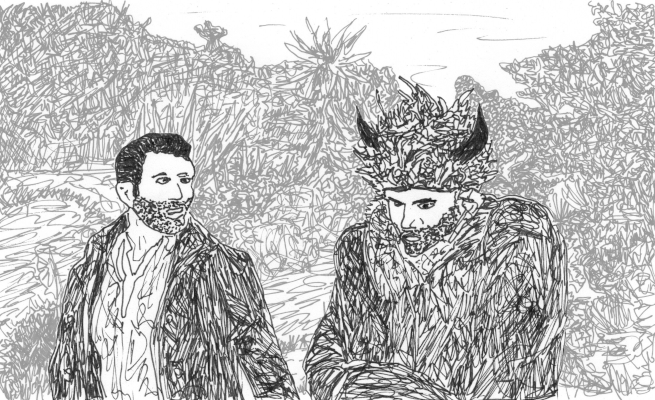 |
(Italiano) Helmut pesca un grosso pesce dalla zattera. Per grigliarlo, approdano su un'isola del Reno che non è un'isola qualsiasi. Helmut diventa incredibilmente creativo lì e vive un'esperienza sciamanica per la quale deve pagare un prezzo. |
(Deutsch) Helmut fängt vom Floß aus einen großen Fisch. Um ihn zu grillen, landen sie an einer Insel im Rhein, die keine gewöhnliche Insel ist. Helmut wird auf ihr erstaunlich kreativ und hat dort ein schamanisches Erlebnis, für das er einen Preis bezahlen muss. Special Version | ||
Odins Helm Tag 33 Heinz: Brauchst du Hilfe? |
Day 33 Heinz: Do you need help? |
Jour 33 Heinz : T'as besoin d'un coup de main ? |
Giorno 33 Heinz: Hai bisogno di una mano? |
Día 33 Heinz: ¿Necesitas ayuda? |
(English) Helmut is on a mind trip and Heinz doesn't know what to make of it. On the one hand, the shaman Helmut can see into the future and prevent danger, but on the other hand, he posesses a kind of knowledge that Heinz doesn't want to share with him under any circumstances. |
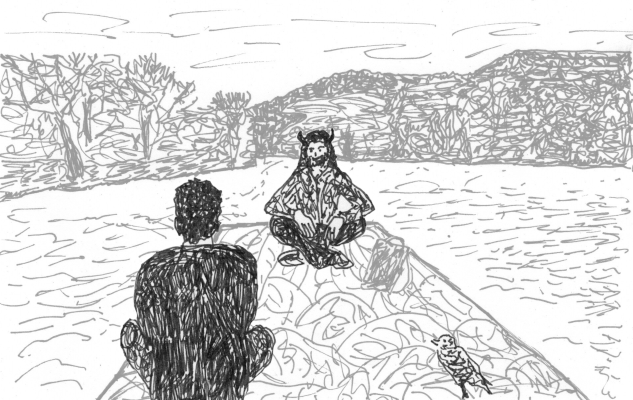 |
(Italiano) Helmut è come su un altro pianeta e Heinz non sa bene cosa pensare. Da un lato, lo sciamano Helmut può vedere il futuro e prevenire i pericoli, ma dall'altro possiede un tipo di conoscenza che Heinz non vuole assolutamente che lui conosca. |
(Deutsch) Helmut ist auf einem Trip und Heinz weiß nicht, was er davon halten soll. Einerseits kann der Schamane Helmut in die Zukunft sehen und Gefahren vorbeugen, andererseits hat er eine Art von Wissen, die Heinz auf gar keinen Fall mit ihm teilen will. Special Version | ||
Tag 34 Heinz: Wie geht's deinem Auge? |
Day 34 Heinz: How's your eye? |
Jour 34 Heinz : Comment va ton il ? |
Giorno 34 Heinz: Come va l'occhio? |
Día 34 Heinz: ¿Cómo está tu ojo? |
(English) They arrive further west by the sea than they had anticipated, but that does not matter. Eager for adventure, they explore the beach and discuss their next steps when they notice a distinctive location that will set their journey on a new course. |
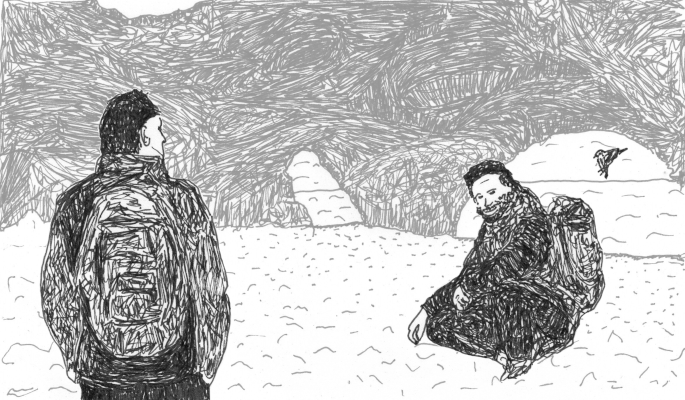 |
(Italiano) Arrivano al mare più a ovest di quanto pensassero, ma non importa. Pieni di spirito d'avventura, esplorano la spiaggia e discutono su come procedere, quando notano un luogo particolare che cambierà il corso del loro viaggio. |
(Deutsch) Sie kommen weiter westlich am Meer an, als sie gedacht haben, aber das spielt keine Rolle. Voller Abenteuerlust erkunden sie den Strand und beraten sich über ihre Vorgehensweise, als sie einen auffälligen Ort bemerken, der ihre Reise in neue Bahnen lenken wird. Special Version | ||
Tag 40 Heinz: Da kommt er wieder. Er ist ganz aufgeregt. Biek biek |
Day 40 Heinz: Here he comes again. He's all excited. Beek beek |
Jour 40 Heinz : Le voilà qui revient. Il est tout excité. Bique bique |
Giorno 40 Heinz: Eccolo che torna. È tutto eccitato. Biik biik |
Día 40 Heinz: Ahí viene otra vez. Está muy emocionado. Biik biik |
(English) Helmut's prophecy has come true and they encounter humans for the first time. Intercultural understanding is not easy, but the two manage to establish initial contact and even prove themselves useful. |
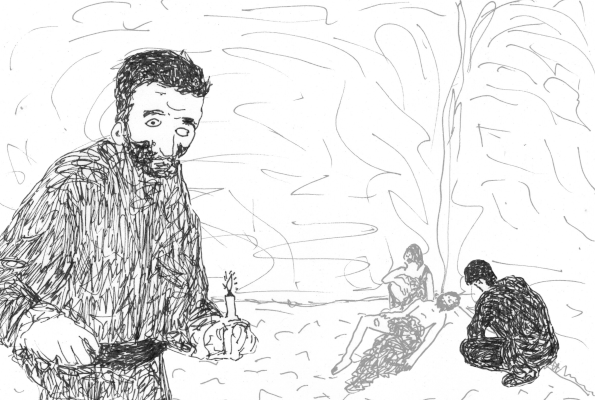 |
(Italiano) La profezia di Helmut si è avverata e incontrano gli umani per la prima volta. La comunicazione tra le culture non è facile, ma i due riescono a stabilire un primo contatto e persino a rendersi utili. |
(Deutsch) Helmuts Prophezeiung hat sich erfüllt und sie treffen zum ersten Mal auf Menschen. Die interkulturelle Verständigung ist nicht leicht, doch es gelingt den beiden, einen ersten Kontakt herzustellen und sich sogar als nützlich zu erweisen. Special Version | ||
Tag 40 Heinz: (Halt vorsichtshalber den Klappspeer bereit!) |
Day 40 Heinz: (Hold the folding spear ready, just in case!) |
Jour 40 Heinz : (Tiens la lance pliante à la main, au cas où !) |
Giorno 40 Heinz: (Tieni pronta la lancia pieghevole, non si sa mai!) |
Día 40 Heinz: (¡Ten lista la lanza plegable, por si acaso!) |
(English) Chaos breaks out. The Boys have to watch as their backpacks are ransacked and they are helpless due to the superior numbers of the others. The predicament gives Heinz an idea and he asks Helmut to put on Odin's helmet. |
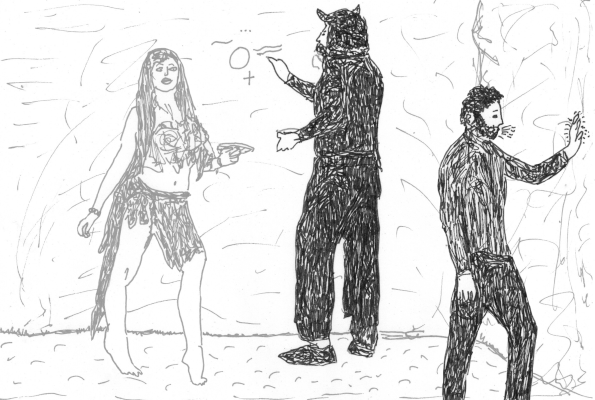 |
(Italiano) Scoppia il caos. I Ragazzi devono guardare mentre i loro zaini vengono saccheggiati e sono impotenti perché gli altri sono in tanti. L'emergenza dà un'idea a Heinz, che chiede a Helmut di mettersi l'elmo di Odino. |
(Deutsch) Chaos bricht aus. Die Jungs müssen mitansehen, wie ihre Rucksäcke geplündert werden und sie sind hilflos aufgrund der Überzahl der anderen. Die Not bringt Heinz auf eine Idee und er bittet Helmut, Odins Helm aufzusetzen. Special Version | ||
Tag 40 Helmut: Hey, Signore! Lass mich los jetzt, Pappnase, es reicht! |
Day 40 Helmut: Hey, signore! Let me go now, you buffoon, that's enough! |
Jour 40 Helmut : Hé, signore ! Lâche-moi maintenant, espèce de bouffon, ça suffit ! |
Giorno 40 Helmut: Ehi, signore! Lasciami andare, buffone, basta così! |
Día 40 Helmut: ¡Eh, signore! ¡Suéltame ya, payaso, ya basta! |
(English) After getting to know each other, they all sit around the fire in the dome-like cave structure by the sea. Heinz tries to explain to his friend that he shouldn't transfer his own preconceptions onto these early humans, but Helmut doesn't listen to him. |
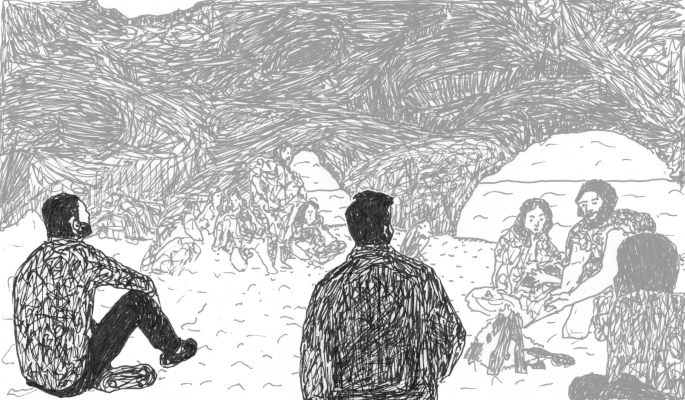 |
(Italiano) Dopo essersi conosciuti, tutti si siedono attorno al fuoco nella struttura a cupola simile a una caverna sul mare. Heinz cerca di spiegare al suo amico che non deve trasferire la sua visione del mondo sui primi esseri umani, ma Helmut non lo ascolta. |
(Deutsch) Nachdem sie sich kennengelernt haben, sitzen alle am Feuer in der kuppelartigen Höhlenstruktur am Meer. Heinz versucht, seinem Freund zu vermitteln, dass er nicht seine eigenen Vorstellungen auf die Frühmenschen übertragen soll, aber Helmut hört nicht auf ihn. Special Version | ||
Edle Wilde Tag 40 Helmut: Ein sehr nettes Urvölkchen. Die verstehen es, zu leben! So ursprünglich. |
Day 40 Helmut: A very nice bunch of primeval people. They know how to live! So authentic. |
Jour 40 Helmut : Un groupe très sympa de gens préhistoriques. Ils savent comment vivre ! Tellement authentiques. |
Giorno 40 Helmut: Un gruppo di gente preistorica davvero simpatica. Sanno come si vive! Sono così autentici. |
Día 40 Helmut: Un grupo muy simpático de gente prehistórica. ¡Saben cómo vivir! Son tan auténticos. |
(English) A few days later, the group travels inland and the Boys help carry the tent poles. Heinz has overcome his initial crisis and found his place in the community, while Helmut is somewhat losing track of things. |
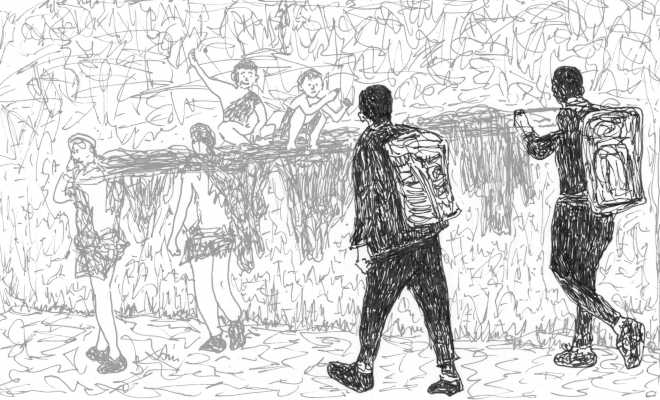 |
(Italiano) Qualche giorno dopo, il gruppo si sposta nell'entroterra e i Ragazzi danno una mano a trasportare i pali delle tende. Heinz ha superato la crisi iniziale e si è integrato nel gruppo, mentre Helmut è un po' disorientato. |
(Deutsch) Einige Tage später reist die Gruppe ins Landesinnere und die Jungs helfen beim Tragen der Zeltstangen. Heinz hat seine anfängliche Krise überwunden und sich in die Gemeinschaft eingefunden, während Helmut ein wenig den Überblick verliert. Special Version | ||
Tag 43 Heinz: Wir wären dann soweit. Helmut? |
Day 43 Heinz: We're ready to go then. Helmut? |
Jour 43 Heinz : On est prêts à partir. Helmut ? |
Giorno 43 Heinz: Allora, siamo pronti per partire. Helmut? |
Día 43 Heinz: Bueno, estamos listos para partir. ¿Helmut? |
(English) Helmut's streak of bad luck continues. Not only does he injure himself with an obsidian knife while cutting vegetables, but he also encounters unexpected difficulties when trying to build a wheel. Heinz's patience is at an end, but there is nothing he can do about Helmut's frenzy. |
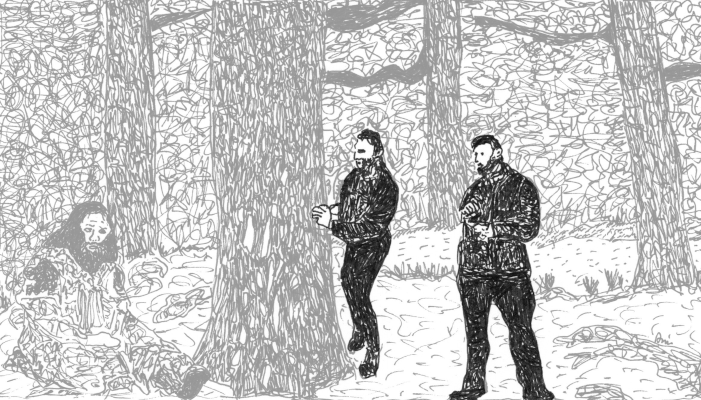 |
(Italiano) La sfortuna di Helmut non finisce mai. Non solo si ferisce con un coltello di ossidiana mentre taglia le verdure, ma incontra anche difficoltà inaspettate quando cerca di costruire una ruota. Heinz è al limite della pazienza, ma non può fare niente contro la frenesia di Helmut. |
(Deutsch) Helmuts Pechsträhne reißt nicht ab. Nicht nur verletzt er sich beim Gemüseschneiden mit einem Obsidianmesser, er bekommt auch ungeahnte Schwierigkeiten, als er ein Rad bauen will. Heinz' Geduld ist am Ende, aber er kann nichts gegen Helmuts Raserei tun. Special Version | ||
Tag 47 Heinz: Und, was sagst du zu unserem neuen Wohnort? Und zu dem Gemüse. |
Day 47 Heinz: So, what do you think of our new home? And the vegetables. |
Jour 47 Heinz : Alors, qu'est-ce que tu penses de notre nouveau lieu de vie ? Et des légumes. |
Giorno 47 Heinz: Allora, che ne pensi del nostro nuovo posto? E delle verdure? |
Día 47 Heinz: ¿Y qué te parece nuestro nuevo lugar de residencia? ¿Y las verduras? |
(English) For two weeks now, Helmut has been trying in vain to build wheels for a car. He works stubbornly in the clearing until Heinz can no longer bear to watch and persuades his friend to return to the group. |
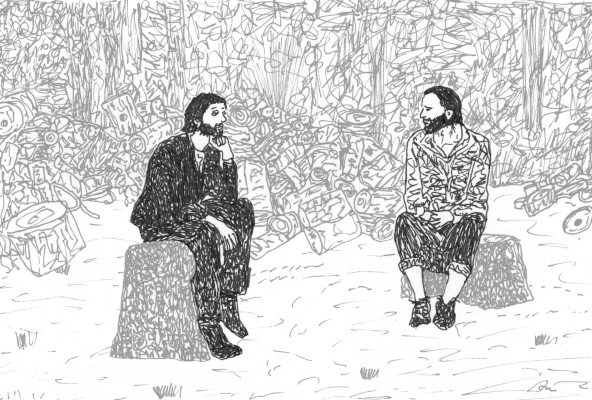 |
(Italiano) Sono già due settimane che Helmut cerca di costruire le ruote per un carro, ma non ci riesce. Lavora con tanta determinazione nella radura finché Heinz non ce la fa più a guardare e convince il suo amico a tornare con il gruppo. |
(Deutsch) Zwei Wochen lang versucht Helmut nun schon vergeblich, Räder für einen Wagen zu bauen. Verbissen arbeitet er auf der Lichtung, bis Heinz es nicht mehr mitansehen kann und seinen Freund überredet, in den Kreis der Gruppe zurückzukehren. Special Version | ||
Tag 61 Helmut: Ah, Heinz, schön, dich zu sehen! Setz dich doch! Ist das ein Maiskolben, den du da in der Hand hältst? Das Gelbe. |
Day 61 Helmut: Ah, Heinz, good to see you! Have a seat! Is that a corn cob you're holding in your hand? The yellow thing. |
Jour 61 Helmut : Ah, Heinz, ça fait plaisir de te voir ! Assieds-toi donc ! C'est un épi de maïs que tu tiens dans ta main ? Le truc jaune. |
Giorno 61 Helmut: Ah, Heinz, che bello vederti! Siediti pure! È una pannocchia quella che hai in mano? Quella cosa gialla. |
Día 61 Helmut: ¡Ah, Heinz, qué alegría verte! ¡Siéntate! ¿Es una mazorca de maíz lo que tienes en la mano? Esa cosa amarilla. |
(English) Helmut has found a new use for his prehistoric lathe: chess pieces. A month later, more than half the group is in chess fever. Heinz is worried that they might inadvertently change the course of history in the process. |
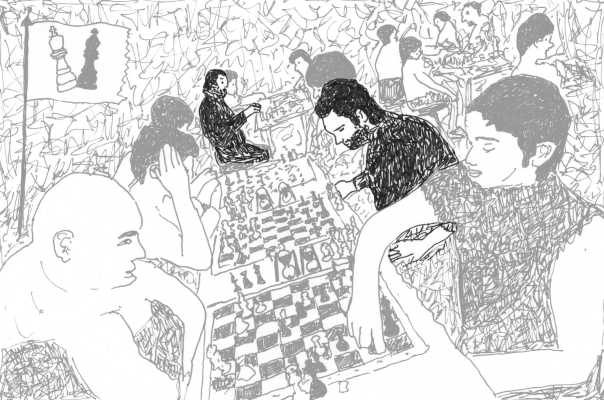 |
(Italiano) Helmut ha trovato un nuovo uso per il suo tornio preistorico: pezzi di scacchi. Un mese dopo, più della metà del gruppo è in preda alla febbre degli scacchi. Heinz teme che possano inavvertitamente cambiare il corso della storia a causa loro. |
(Deutsch) Helmut hat eine neue Verwendung für seine prähistorische Drehbank gefunden: Schachfiguren. Einen Monat später ist mehr als die Hälfte der Gruppe im Schachfieber. Heinz macht sich Sorgen darüber, dass sie damit vielleicht ungewollt den Lauf der Geschichte verändern. Special Version | ||
Tag 90 Heinz: Ich will dich ja nicht runterziehen, aber mir kommen langsam ein paar Bedenken. |
Day 90 Heinz: I don't want to drag you down, but I'm starting to have a few doubts. |
Jour 90 Heinz : Je ne veux pas te tirer vers le bas, mais je commence à avoir quelques doutes. |
Giorno 90 Heinz: Non voglio trascinarti in basso, ma comincio ad avere qualche dubbio. |
Día 90 Heinz: No quiero desanimarte, pero empiezo a tener algunas dudas. |
(English) Every twelve days, the tribe celebrates a day of honor for one of its members. Heinz is uncomfortable about it being his turn, so Helmut has to motivate him a little. But then everything goes well, and the two notice how quickly the primeval humans are developing. |
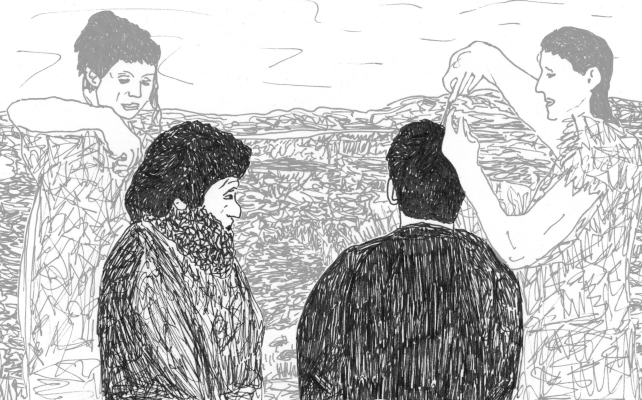 |
(Italiano) Ogni dodici giorni la tribù festeggia un giorno d'onore per uno dei suoi membri. Heinz è a disagio perché quel giorno tocca a lui, quindi Helmut deve motivarlo un po'. Ma poi tutto va bene e i due notano quanto velocemente si evolvano gli uomini preistorici. |
(Deutsch) Alle zwölf Tage feiert der Stamm einen Ehrentag für eines der Mitglieder. Heinz ist es unangenehm, an diesem Tag an der Reihe zu sein, sodass Helmut ihn ein wenig motivieren muss. Dann aber läuft alles gut und den beiden fällt auf, wie schnell sich die Urmenschen entwickeln. Special Version | ||
Ehrentag Tag 120 Helmut: Biek biek. Ah, Bote, äh, Bieker, da bist du ja! Ähem, Heinz! Wieder sind zwölf Tage vergangen. Weißt du, was das bedeutet? |
Day 120 Helmut: Beek beek. Ah, messenger, uh, Beeker, there you are! Ahem, Heinz! Another twelve days have passed. Do you know what that means? |
Jour 120 Helmut : Bique bique. Ah, messager, euh, Biqueur, te voilà ! Ahem, Heinz ! Douze jours se sont encore écoulés. Tu sais ce que cela signifie ? |
Giorno 120 Helmut: Biik biik. Ah, messaggero, ehm, Bìker, eccoti! Dunque, Heinz! Sono passati altri dodici giorni. Sai cosa significa? |
Día 120 Helmut: Biik biik. Ah, mensajero, eh, Bíker, ¡ahí estás! ¡Ejem, Heinz! Han pasado otros doce días. ¿Sabes lo que eso significa? |
(English) Helmut thinks that the development of the prehistoric group has come to an end. Heinz does not share this opinion and introduces his friend to some of the key ideas of the Enlightenment, while keeping an eye out for Ano-eef, whom he calls Fiona. |
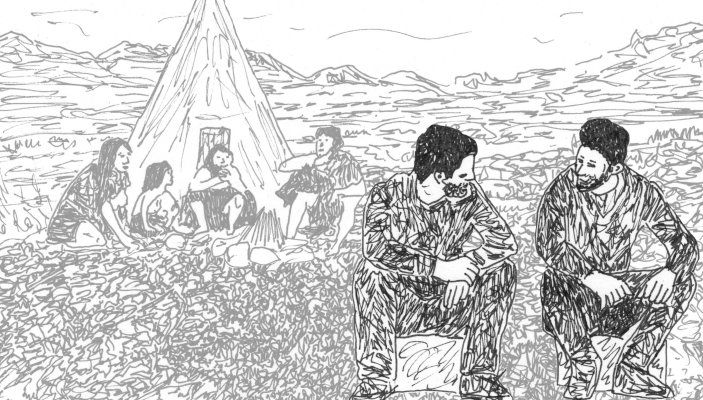 |
(Italiano) Helmut pensa che l'evoluzione del gruppo preistorico sia arrivata alla fine. Heinz non è d'accordo e spiega ad Helmut alcune delle idee principali dell'Illuminismo, mentre cerca con lo sguardo Anoif, che lui chiama Fiona. |
(Deutsch) Helmut denkt, dass die Entwicklung der prähistorischen Gruppe ein Ende gefunden hat. Heinz teilt diese Meinung nicht und bringt seinem Freund einige der wesentlichen Ideen der Aufklärung nahe, während seine Augen nach Ano-if Ausschau halten, die er Fiona nennt. Special Version | ||
Tag 151 Heinz: Fiona sagt, dass wir bald aufbrechen werden. Sibat will heute Abend in einem schamanischen Ritual den genauen Tag bestimmen. |
Day 151 Heinz: Fiona says we're leaving soon. Zibat wants to determine the exact day tonight during a shamanic ritual. |
Jour 151 Heinz : Fiona dit que nous allons bientôt partir. Zibat veut déterminer le jour exact lors d'un rituel chamanique ce soir. |
Giorno 151 Heinz: Fiona dice che presto partiremo. Zibat vuole decidere il giorno esatto tramite un rituale sciamanico stasera. |
Día 151 Heinz: Fiona dice que pronto nos pondremos en marcha. Sibat quiere determinar el día exacto esta noche mediante un ritual chamánico. |
(English) When the snow arrives, the group has settled into their winter residence, a large cave. Helmut notices that the firewood is running low and calls everyone together. He also notices that Heinz has a talent that has never been recognized before. |
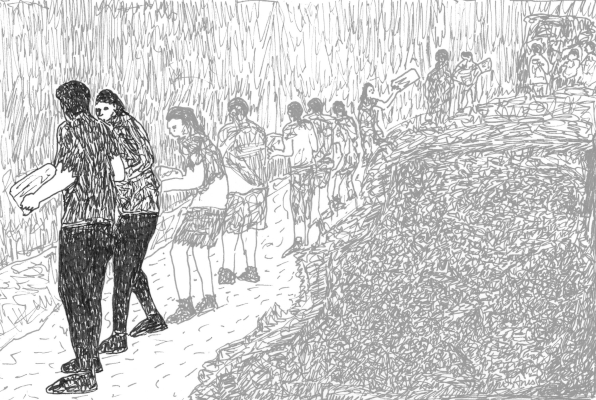 |
(Italiano) Quando arriva la neve, il gruppo si è sistemato nella sua residenza invernale, una grande caverna. Helmut nota che la legna da ardere sta finendo e chiama tutti. Si accorge inoltre che Heinz ha un talento che non è mai stato apprezzato. |
(Deutsch) Als der Schnee kommt, hat sich die Gruppe in ihrem Winterdomizil eingerichtet, einer großen Höhle. Helmut bemerkt, dass das Feuerholz knapp wird, und ruft alle zusammen. Ihm fällt außerdem auf, dass Heinz eine Begabung hat, die noch nie gewürdigt worden ist. Special Version | ||
Tag 210 Helmut: Das Feuerholz geht zur Neige. Wir müssen wieder zum Lager. Sibat? Sibat! Tock tock. Holz! Ja! |
Day 210 Helmut: We're running out of firewood. We have to go to the wood store again. Zibat? Zibat! Knock knock. Wood! Yes! |
Jour 210 Helmut : Le bois de chauffage s'épuise. Il faut retourner à la réserve. Zibat ? Zibat ! Toc toc. Du bois ! Oui ! |
Giorno 210 Helmut: Stiamo finendo la legna da ardere. Dobbiamo andare di nuovo al deposito. Zibat? Zibat! Toc toc. Legna! Sì! |
Día 210 Helmut: Se nos está acabando la leña. Tenemos que volver al almacén. ¿Sibat? ¡Sibat! Toc, toc. ¡Leña! ¡Sí! |
(English) A new spring is dawning, and the Boys are nowhere closer to home. Lost in thought, they sit by the fire in their winter cave until Helmut reports on unexpected cultural and historical developments that make Heinz prick up his ears. |
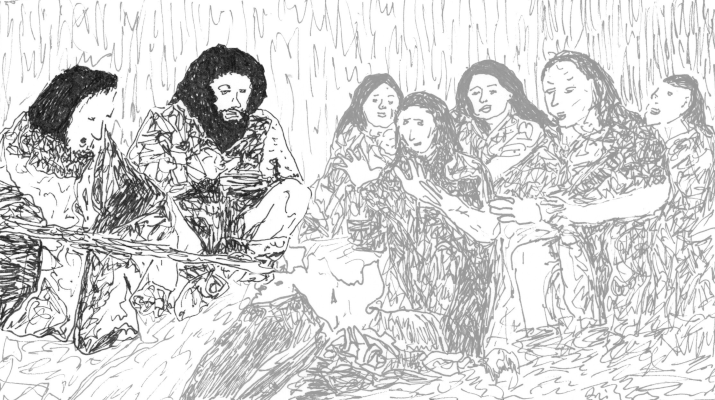 |
(Italiano) Sta arrivando una nuova primavera e i Ragazzi non sono affatto più vicini a casa. Seduti davanti al fuoco nella loro tana invernale, sono persi nei loro pensieri, finché Helmut racconta di alcuni sviluppi storici e culturali inaspettati che attirano l'attenzione di Heinz. |
(Deutsch) Ein neuer Frühling bricht an und die Jungs sind der Heimat kein bisschen nähergekommen. Gedankenverloren sitzen sie am Feuer in ihrer Winterhöhle, bis Helmut von unerwarteten kulturhistorischen Entwicklungen berichtet, die Heinz hellhörig machen. Special Version | ||
Tag 286 Heinz: Mit dem zeitlichen Abstand fallen einem Sachen auf, an die man vorher nicht gedacht hat. |
Day 286 Heinz: With the benefit of hindsight, you notice things you didn't think about before. |
Jour 286 Heinz : Avec le recul, on remarque des trucs auxquels on n'avait pas pensé avant. |
Giorno 286 Heinz: Col senno di poi, ti accorgi di cose a cui prima non avevi pensato. |
Día 286 Heinz: En retrospectiva con el paso del tiempo, te das cuenta de cosas en las que no habías pensado antes. |
(English) The prehistoric group has come full circle and returned to their summer residence. The gaba season has already begun when Unggur and a few others return from hunting and excitedly report on their encounter with other humans. Heinz has a hunch. |
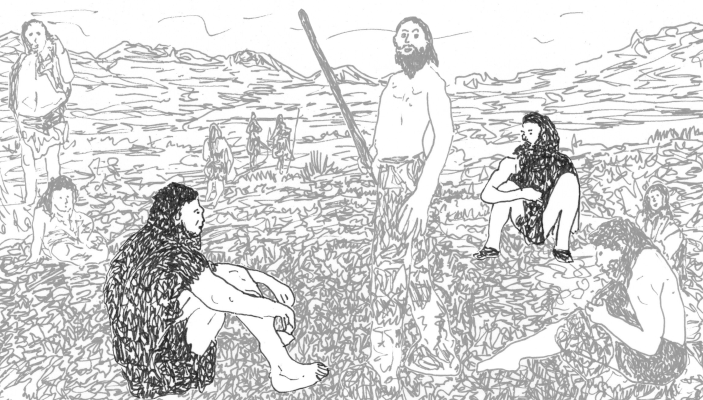 |
(Italiano) Il gruppo preistorico ha chiuso il cerchio ed è tornato alla sua residenza estiva. La stagione del gaba è già iniziata quando Unggur e alcuni altri tornano dalla caccia e raccontano eccitati del loro incontro con altri esseri umani. Heinz sospetta qualcosa. |
(Deutsch) Die prähistorische Gruppe hat den Kreis geschlossen und ist in ihre Sommerresidenz zurückgekehrt. Die Gaba-Saison hat bereits begonnen, als Unggur und einige andere von der Jagd kommen und aufgeregt über ihre Begegnung mit anderen Menschen berichten. Heinz hat eine Ahnung. Special Version | ||
Neues Datum Tag 331 Helmut: Fang auf! |
New Date Day 331 Helmut: Catch! |
Nouvelle date Jour 331 Helmut : Attrape ! |
Nuova data Giorno 331 Helmut: Prendi! |
Nueva fecha Día 331 Helmut: ¡Atrápala! |
(English) What Helmut has been warning his friend about for months has now come to pass: problems with fake Fiona, alias Ano-eef. However, they don't have time to discuss the matter in detail, because a monstrous danger appears out of nowhere. |
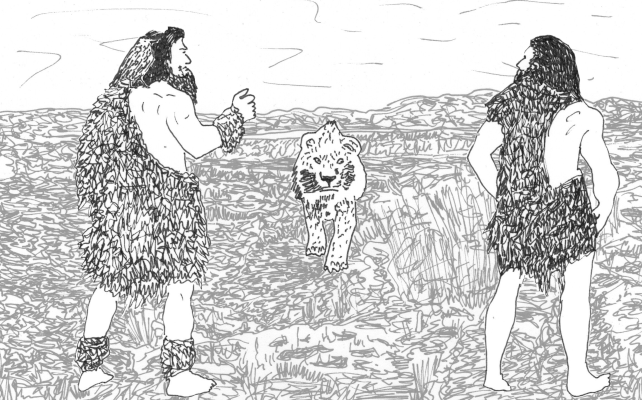 |
(Italiano) Quello che Helmut aveva previsto da mesi per il suo amico è finalmente successo: problemi con pseudo-Fiona, alias Anoif. Ma non hanno tempo per discutere la questione, perché un pericolo mostruoso appare dal nulla. |
(Deutsch) Das, wovor Helmut seinen Freund seit Monaten gewarnt hat, ist nun eingetreten: Probleme mit Pseudo-Fiona alias Ano-if. Sie haben allerdings keine Zeit, die Sache abschließend zu besprechen, denn eine monströse Gefahr erscheint aus dem Nichts. Special Version | ||
Tag 334 Helmut: Komm mal bitte grad mit da vorne rüber. Ey, was ist los mit dir? Du rennst hier rum wie Jack Nicholson in Shining. |
Day 334 Helmut: Could you please join me over there? Hey, what's wrong with you? You're running around like Jack Nicholson in The Shining. |
Jour 334 Helmut : Pourrais-tu me rejoindre là-bas ? Hé, qu'est-ce qui ne va pas chez toi ? Tu cours ici comme Jack Nicholson dans Shining. |
Giorno 334 Helmut: Potresti raggiungermi laggiù? Ehi, cosa c'è che non va in te? Stai correndo come Jack Nicholson in Shining. |
Día 334 Helmut: ¿Podrías venir aquí conmigo? Eh, ¿qué te pasa? Corres como Jack Nicholson en El Resplandor. |
(English) Helmut's curiosity leads the Boys to the Neanderthals. Kelhara and Beeker accompanies them on their trip. Helmut isn't afraid, because he now believes himself to be immortal. However, he becomes careless and it is unclear how things will end. |
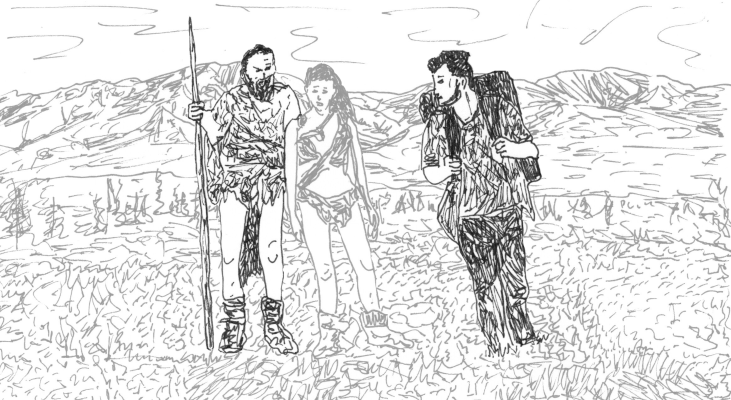 |
(Italiano) La curiosità di Helmut conduce i Ragazzi dai Neandertaliani. Kelhara e Bìker si uniscono al viaggio. Helmut non ha paura perché ora si crede immortale. Tuttavia, diventa imprudente e non si sa come andranno le cose. |
(Deutsch) Helmuts Neugier treibt die Jungs zu den Neandertalern. Kelhara und Bieker begleiten ihren Ausflug. Angst hat Helmut nicht, denn er hält sich jetzt für einen Unsterblichen. Allerdings wird er unvorsichtig und es ist nicht absehbar, wie die Sache ausgeht. Special Version | ||
Tag 335 Heinz: Ich habe die Legende vom Löwen mit dem Dorn in der Pfote begründet. Ich. |
Day 335 Heinz: I originated the legend of the lion with the thorn in its paw. Me. |
Jour 335 Heinz : C'est moi qui ai lancé la légende du lion avec une épine dans la patte. Moi. |
Giorno 335 Heinz: Io ho dato origine la leggenda del leone con la spina nella zampa. Io. |
Día 335 Heinz: Yo di origen la leyenda del león con la espina en la pata. Yo. |
(English) Despite Helmut's clumsiness, the first encounter with the Neanderthals takes a positive turn. But before Heinz can breathe a sigh of relief, his friend gets him into trouble again and someone else has to rescue him. Someone stronger. Much stronger. |
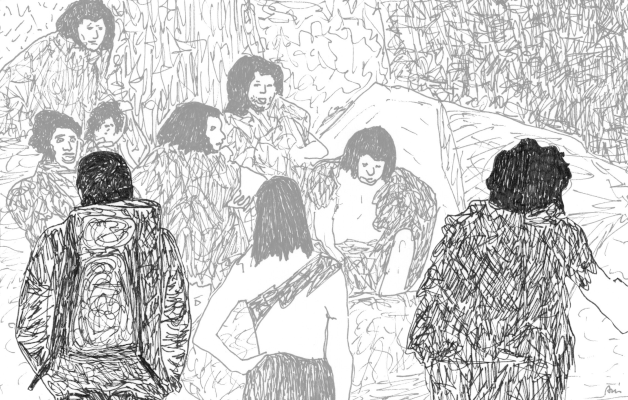 |
(Italiano) Nonostante la goffaggine di Helmut, il primo incontro con i Neandertaliani si svolge in modo positivo. Ma prima che Heinz possa tirare un sospiro di sollievo, il suo amico lo mette nuovamente in una situazione difficile e qualcun altro deve salvarlo. Qualcuno più forte. Molto più forte. |
(Deutsch) Trotz Helmuts Tollpatschigkeit nimmt die erste Begegnung mit den Neandertalern einen positiven Verlauf. Bevor Heinz aber aufatmen kann, bringt sein Freund ihn erneut in eine missliche Lage und jemand anderes muss ihn retten. Jemand Stärkeres. Viel Stärkeres. Special Version | ||
Birkenpech Tag 335 Helmut: Es ist gerade noch mal gutgegangen, hab ich recht? |
Birch Tar Day 335 Helmut: It barely worked out, am I right? |
Jour 335 Helmut : Ça s'est à peine bien passé, n'est-ce pas ? |
Giorno 335 Helmut: È andata a malapena, vero? |
Día 335 Helmut: Al final todo ha salido bien, ¿tengo razón? |
(English) With the help of Kelhara, who reenacts his exploits, and Zork, who writes everything down, Helmut secures himself a favorable place in history. Heinz suffers terribly from his imposture, but he has to keep the truth to himself. |
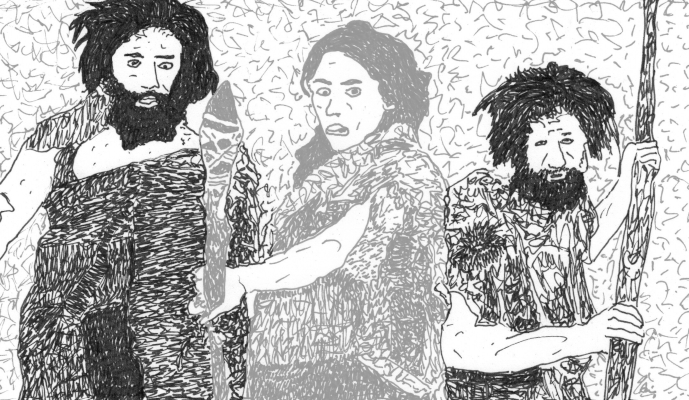 |
(Italiano) Con l'aiuto di Kelhara, che mette in scena le sue imprese eroiche, e di Zork, che scrive tutto, Helmut si assicura un posto di rilievo nella storia. Heinz soffre tantissimo per la sua impostura, ma deve tenere nascosta la verità. |
(Deutsch) Mit der Hilfe von Kelhara, die seine Heldentaten szenisch nachspielt, und Sork, der alles aufschreibt, sichert sich Helmut einen vorteilhaften Platz in der Geschichte. Heinz leidet fürchterlich unter seiner Hochstapelei, aber er darf die Wahrheit nicht verraten. Special Version | ||
Tag 336 Helmut: Und ich bin auf dem Löwen geritten. Kelhara hat's gesehen. |
Day 336 Helmut: And I rode the lion. Kelhara saw it. |
Jour 336 Helmut : Et j'ai chevauché le lion. Kelhara l'a vu. |
Giorno 336 Helmut: E ho cavalcato il leone. Kelhara l'ha visto. |
Día 336 Helmut: Y monté en el león. Kelhara lo vio. |
(English) Heinz finds Helmut in the clubhouse, where he is playing teacher to the prehistoric children, with a blackboard, a globe, and a poorly assembled wolf skeleton. Everything seems completely normal to Heinz and Helmut, but within a few minutes, everything changes. |
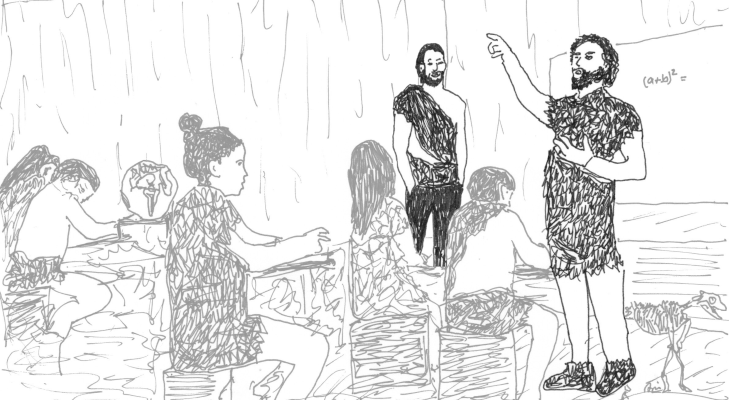 |
(Italiano) Heinz trova Helmut nel club-house, dove fa finta di essere un insegnante per i bambini preistorici, con una lavagna, un mappamondo e uno scheletro di lupo assemblato male. Tutto sembra normale per Heinz e Helmut, ma in pochi minuti tutto cambia. |
(Deutsch) Heinz findet Helmut im Clubhaus, wo er Lehrer für die Urzeitkinder spielt, mit Tafel, Globus und einem falsch zusammengebauten Wolfsskelett. Alles wirkt für Heinz' und Helmuts Verhältnisse völlig normal, als sich innerhalb weniger Minuten alles verändert. Special Version | ||
Tag 338 Heinz: Ach hier im Clubhaus bist du mit den Kindern. Ich dachte schon, dass du den Rattenfänger aus Hameln in deine absurden Geschichten einbauen willst. Was tut ihr hier? |
Day 338 Heinz: Oh, you're here in the clubhouse with the children. I already suspected you wanted to incorporate the Pied Piper from Hamelin into your absurd stories. What are you doing here? |
Jour 338 Heinz : Ah, ici, au club-house, tu es avec les enfants. Je me doutais bien que tu voulais inclure le joueur de flûte de Hamelin dans tes histoires absurdes. Qu'est-ce que vous faites ici ? |
Giorno 338 Heinz: Oh, sei qui nel club-house con i bambini. Sospettavo già che volessi incorporare il pifferaio di Hamelin nelle tue storie assurde. Che ci fate qui? |
Día 338 Heinz: Oh, estás aquí en el club con los niños. Ya sospechaba que querías incorporar al flautista de Hamelin en tus historias absurdas. ¿Qué hacéis aquí? |
(English) All's well that ends well. Everyone makes mistakes, and we shouldn't blame the Boys. After all, they gave us a unique insight into the world as it was many thousands of years ago. And who knows, maybe someone will find Zork's chronicles one day. |
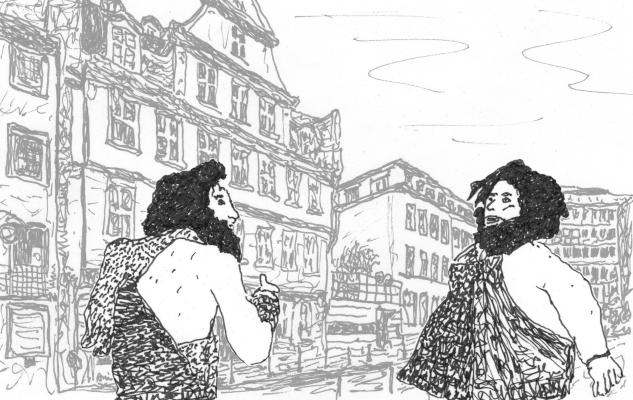 |
(Italiano) Tutto è bene quel che finisce bene. Tutti sbagliano ogni tanto e non dovremmo prendersela con i Ragazzi. Dopotutto, ci hanno dato un'occasione unica per dare un'occhiata al mondo di tanti millenni fa. E chissà, magari un giorno qualcuno troverà le cronache di Zork. |
(Deutsch) Ende gut, alles gut. Jeder macht mal Fehler und man sollte es den Jungs nicht anlasten. Immerhin haben sie uns einen einmaligen Einblick in die Welt vor vielen Jahrtausenden gewährt. Und wer weiß, vielleicht findet irgendwann jemand Sorks Chroniken. Special Version | ||
Tag 4 Helmut: Wupp |
Day 4 Helmut: Whoop |
Jour 4 Helmut : Woup |
Giorno 4 Helmut: Vup |
Día 4 Helmut: Vup |
| Weiter geht's mit Staffel 12: Die Jungs campen / The story continues with The Boys Go Camping |
| up |  |
| Datenschutzerklärung und Impressum (data privacy statement and imprint) |